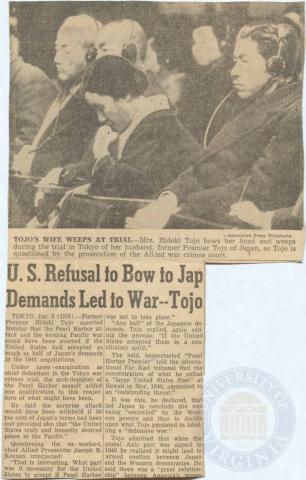
Page 1
| Parent | Newspaper Cutting - U.S. Refusal to Bow to Jap Demands Led to War -- Tojo |
|---|---|
| Date | 5 January 1948 |
| Language | English |
| Collection | Tavenner Papers & IMTFE Official Records |
| Box | Box 13 |
| Folder | Newspaper Clippings 1947-1948 |
| Repository | University of Virginia Law Library |
U. S. Refusal to Bow to Jap Demands Led to War – Tojo
Tokyo, Jan 5 (INS) – Former Premier Hideki Tojo asserted Monday that the Pearl Harbor attack and the ensuing Pacific war could have been averted if the United States had accepted as much as half of Japan’s demands in the 1941 negotiations.
Under cross-examination as chief defendant in the Tokyo war crimes trial, the arch-designer of the Pearl Harbor assault added one qualification to this conjecture of what might have been.
He said the surprise attack would have been withheld if 50 per cent of Japan’s terms had been met provided also that “the United States truly and honestly desired peace in the Pacific.”
Questioning the ex-warlord, chief Allied Prosecutor Joseph B. Keenan interjected:
“That is interesting. What part was it necessary for the United States to accept if Pearl Harbor was not to take place.”
“Any half” of the Japanese demands, Tojo replied, again adding the proviso: “If the United States accepted them in a conciliatory spirit.”
The bald, bespectacled “Pearl Harbor Premier” told the international Far East tribunal that the concentration of what he called a “lag United States fleet” at Hawaii in May, 1940, amounted to an “outstanding threat.”
It was this, he declared, that led Japan to conclude she was being “encircled” by the Western powers and thus to decide upon what Tojo persisted in labeling a “defensive war.”
Tojo admitted that when the global Axis pact was signed in 1940 he realized it might lead to armed conflict between Japan and the Western democracies. He said there was a “great relationship” between America’s moves
